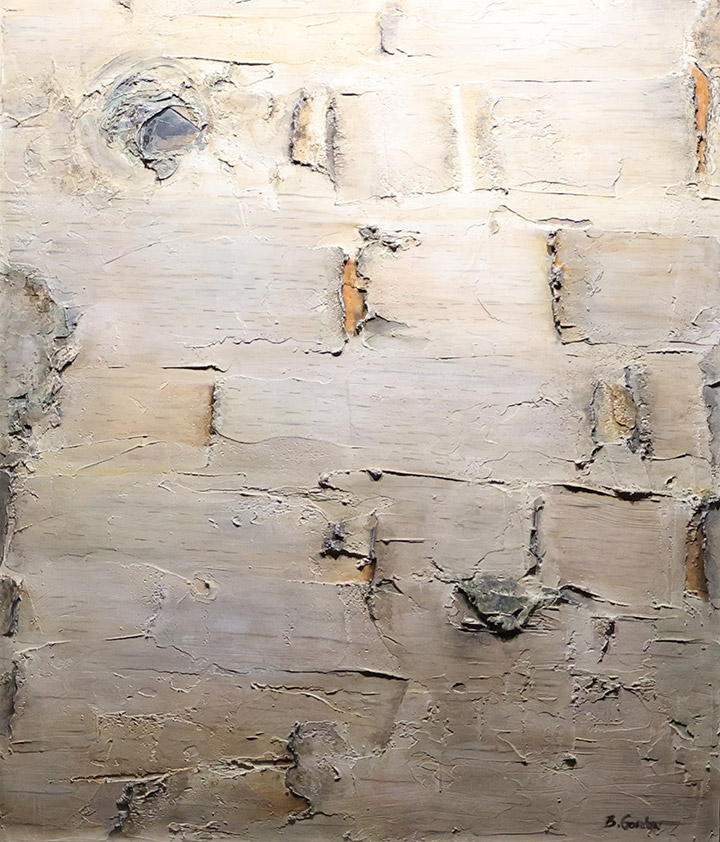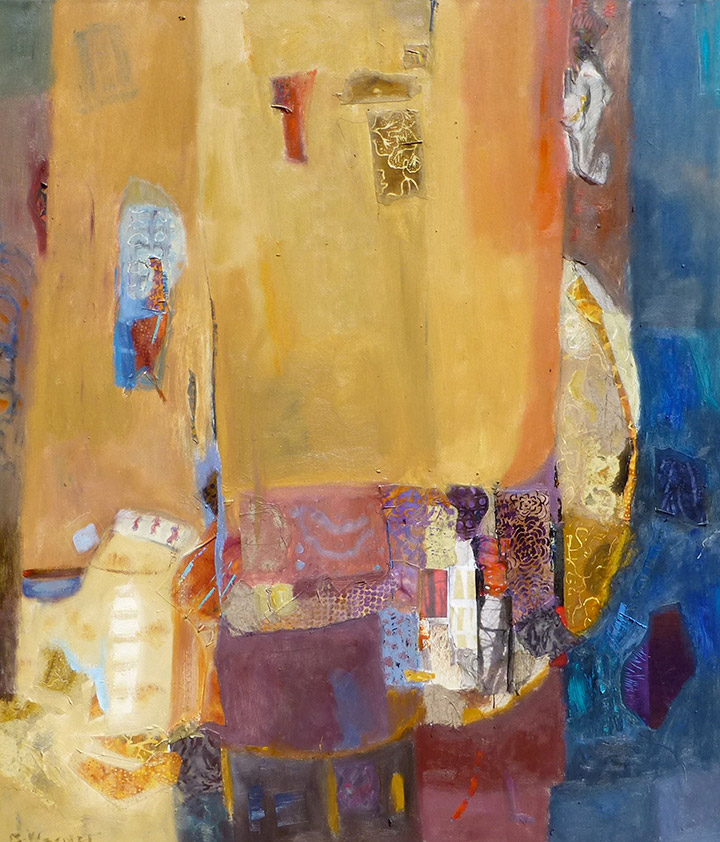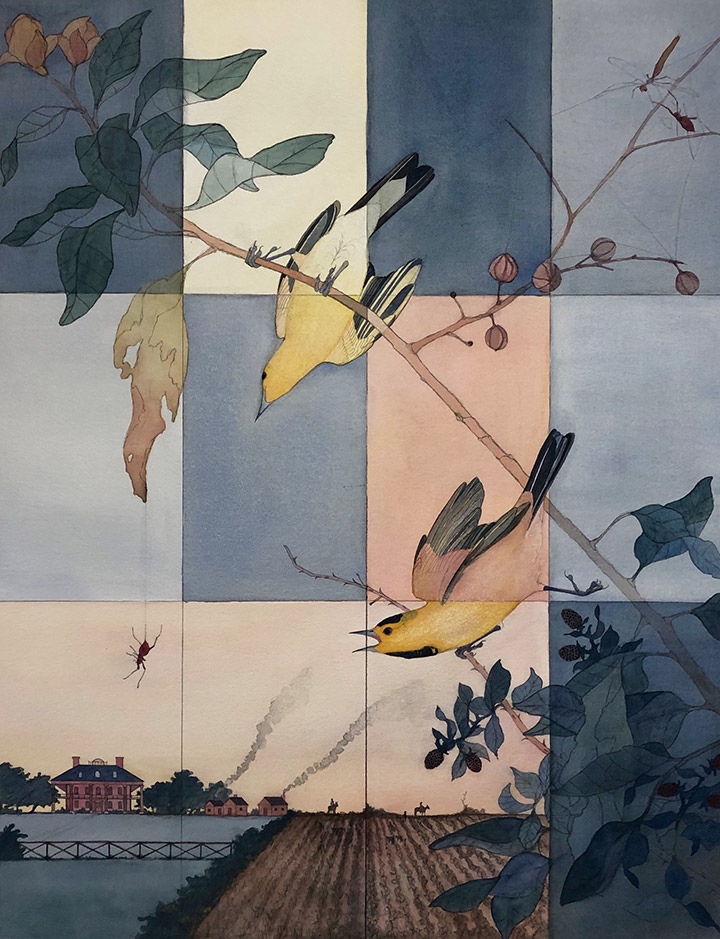The soaring windows of the Lodge at Spruce Peak frame the expansive views like everchanging, year-round works of art. And we typically think setting off into the hillsides and forests is the portal to the ultimate Vermont experience. But we can also connect with the soul of the Green Mountains through meaningful local artwork.
Art has been woven into nearly every aspect of life at Spruce Peak, from paintings and photographs adorning The Club walls to one-of-a-kind decor in the guest rooms to the sculptural archway framing the Village Green.
“In considering artwork for Spruce Peak, we strove to represent the rich and diverse community of Vermont artists and the multitude of mediums in which they work,” says Libbie Moeykens, vice president of development for Spruce Peak. “The pieces we chose to acquire reflect the history, brilliance, and textures of the surrounding natural world.”
After all, historically the verdant Vermont landscape has attracted artists as varied as Albert Bierstadt in the 19th century and Edward Hopper, who traveled the backroads during summers in the 1920s and 1930s in search of the perfect vista. Today, the beauty of the land is part of the creative ethos that inspires the artists and designers whose work has been thoughtfully integrated throughout Spruce Peak.
Here, four of those artists let us in on their fascinating creative process.

WAGNER, BARBARA
Glimpses A
Oil on canvas, 2011
The Alpine Club Dining Room at The Club at Spruce Peak "I am a color junkie and weaver of patterns. The subtleties and endless combinations are electric, powerful stimulants, adrenaline rushes—sparks fly!"
Barbara Gordon
"This white birch is heavily textured with acrylic compounds."
Stowe-based artist Barbara Gordon is a non-stop dynamo of creative energy, driven by an innate curiosity and inspired by the area’s abundant natural beauty. Several years ago, she became enamored with the distinctive patterning of birch bark, which has a white, skin-like surface marked by striations of black, grey, and sienna, along with lichen. The trees served as a muse for the series Sterling Birch, displayed at the Club at Spruce Peak.
“I have a fascination with making things that look realistic,” Gordon says. This obsession is reflected in Sterling Birch, which features detailed, three-dimensional depictions of bark so lifelike, you can almost smell the peat and petrichor.
In order to craft the rustic ridges, indentations, and knots that render her trompe-l'oeil paintings transportive, rather than purely decorative, she looks beyond traditional painting methods. “I used all kinds of stuff—sawdust, anything that I’d find at a hardware store—to muck around,” Gordon says. She then combines acrylic paint with these unconventional art materials to build up the texture.
An additional element of intrigue is the magnified sense of perspective. Offering such a close-up view makes you feel as if you're inches away from an actual tree. With no suggestion of perspective, the effect is simultaneously hyper-real yet abstract—it’s hard to peel your eyes away.

Fragmentary Weavings 13
Oil with mixed media, 2017
The Penthouses within The Lodge at Spruce Peak
Barbara Wagner
"For me, art is a reactionary process. I draw energy from fireworks on the canvas—the giving and taking; the adding and subtracting; an interplay of purposefulness, accident, and invention."
For 10 years, Barbara Wagner taught watercolor painting, earning a reputation as a talented watercolorist best known for her misty landscapes and scenes of skiers racing down Vermont’s snowy peaks. But when she was introduced to oil painting, her artistic vision expanded, as the paint’s flexibility and rich color range allowed her to explore abstract shapes and forms.
Wagner’s innate aptitude as a colorist blossomed in large canvases influenced by woven textiles from ancient cultures and whimsical folk art. She calls herself a “gleaner”, an avid collector of swatches of fabric, handmade paper, pieces of horsehair, “all kinds of stuff” that she incorporates into her work. Her paintings are built-up in layers, “like the stored energy found in Pompei.”
Wagner had shown extensively throughout New England when her dealer brought her paintings to the attention of the design team at Spruce Peak. Her work resonated, so she created five pieces specifically for the Club. “I don’t consider myself a landscape painter, but the impetus for these paintings, part of a series titled Glimpses, was Vermont in the fall,” Wagner says. The warm, russet tones convey the abstract impressions of a place recalled through the veils of memory.

Branch Studies
Watercolor on paper, 2021 The Lodge at Spruce Peak guestrooms
Nik Kotovitch
"I was inspired by the foliage, flora, and scenery of the Stowe area."
Eleven years ago, Spruce Peak was the first ski resort community in the United States to earn the prestigious Audubon International Certification, in recognition of our efforts to preserve and honor the natural beauty of the environment. So when called upon to reimagine the guest rooms for the Lodge at Spruce Peak, the design team drew inspiration from the iconic book Birds of America, in which revered ornithologist John James Audubon documented the first comprehensive pictorial record of North American bird species between the years of 1827-1839.
The designers selected images of native Vermont birds from the book, and asked local multimedia artist Nik Kotovitch to reinterpret them by adding hand-painted details and narratives from the Vermont landscape.
The project was a natural fit for Kotovitch, who grew up in a family of artists on a Vermont farm, and has been incorporating Audubon prints into his artwork for years. “My mom’s studio was filled with his books and other natural history books,” he says. “As a child, I was an avid bird-watcher and belonged to the Cornell Lab of Ornithology Young Birders Association, which deepened my understanding of Audubon’s achievements.”
His first step was to create a series of original watercolors. “I painted images of indigenous ecological elements, like plants, insects, and flowers,” Kotovitch says. “Then I photographed both these paintings, as well as pieces of fabric for texture.” Using a digital layering process, he combined the photos with elements from the Audubon prints.
The resulting framed works on paper are a delicate balance between abstract and realistic forms that feel contemporary, but never lose sight of their original grounding in nature.

Untitled
Digital art, 2020 The Lodge at Spruce Peak guestrooms
Benjamin Patrick
"I enjoy the transformation of art in all its elements: multiplicity, serendipity, and synchronicity. It gives us a better understanding of our histories and what we will become."
When you set foot inside your guest room at the Lodge at Spruce Peak, the first thing your eyes gravitate toward—after absorbing the view, of course—is a striking armoire featuring a gauzy bucolic Vermont landscape in shades of gray. It’s the collective work of Luigi Lucioni, a 20thcentury Italian American fine artist, and Benjamin Patrick, a present-day artist and Stowe native.
Lucioni painted traditional landscapes of Stowe and Mt. Mansfield during the summers, while living in a farmhouse in Manchester, Vermont. Considered one of the great Regionalist artists, he had a deep understanding and reverence for the land.
When Spruce Peak approached Patrick with a design concept to reimagine Lucioni’s artwork through a contemporary lens, he was immediately intrigued. “I like to reunite people with history,” he says. “I return again and again to archives, searching for things that inspire me.”
Patrick used a two-inch detail of a 1944 Lucioni etching titled Vermont Splendor as source material for the design covering the armoires. He digitally enlarged the image to a scale of seven feet. Next, using a 1922 topographical map of Stowe that he found in a Texas archive, Patrick combined and layered the map with the magnified Lucioni fragment.
He worked for months tweaking the color and the layering to achieve the desired look. “I consider myself a visual translator, using digital language to give history a new life,” Patrick says. The effect is magical, like a hazy remembered dream, a perfect melding of history, art, and décor.
